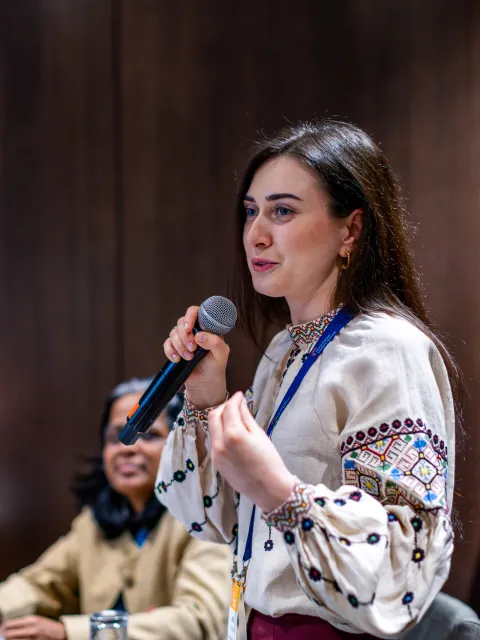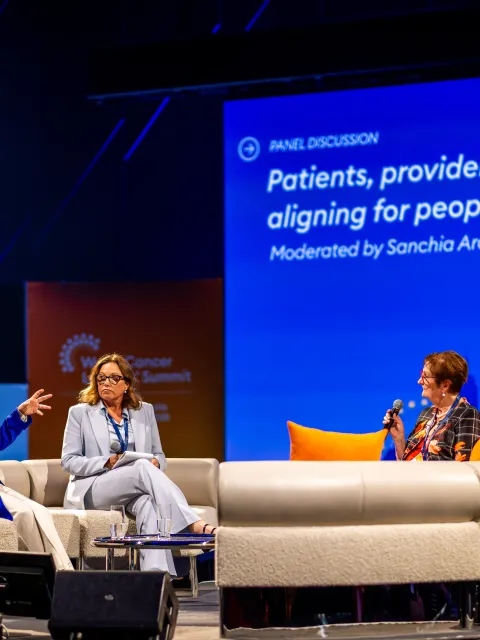Over EUR 1 million awarded to collaborative implementation research projects to advance cancer prevention in Europe
The Reimagining Cancer Research in Europe initiative seeks to enhance the implementation of evidence-based cancer prevention strategies throughout Europe by funding three collaborative research projects.

HIGHLIGHTS
- The Reimagining Cancer Research in Europe initiative is a collaboration between UICC and UICC members, the Dutch, Swedish, and Danish cancer societies, as well as the International Agency for Research on Cancer (IARC).
- The initiative supports the scaling up of evidence-based cancer prevention strategies across Europe.
- 1.2 million Euros has been awarded to collaborating investigators in six European countries for implementation research projects on cancer prevention that focus on screening and early detection.
With 40% of cancer cases in Europe being preventable, the Reimagining Cancer Research in Europe Initiative seeks to support the scale-up of existing evidence-based interventions for cancer prevention into health system policies and practices and thereby reduce the burden of cancer across Europe.
This initiative is a collaboration between the Dutch, Swedish and Danish cancer societies, as well as UICC and the International Agency for Research on Cancer (IARC), with the Dutch Cancer Society being the single largest funder.
“Preventing cancer starts with implementing effective interventions. By translating research into real-world practice, we can really make a difference. Strengthening implementation research and fostering collaboration across the EU are crucial steps. By funding these joint European projects, we can significantly improve early cancer detection and save countless lives.”
– Dorine Manson, Managing Director of the Dutch Cancer Society (KWF)
The need for additional investments in implementation research in cancer prevention was voiced by UICC members in Europe in a series of dedicated workshops that UICC organised in 2021-2022. This was further validated by a 2023 Lancet Oncology Commission report on the challenges facing European cancer research.
The Reimagining Cancer Research in Europe initiative seeks to promote international collaboration and the sharing of expertise and lessons learned across countries to strengthen cancer prevention in the region. The initiative supports and is aligned with Europe’s Beating Cancer Plan and Cancer Mission.
“With these grants, we demonstrate the power of international collaboration in strengthening cancer prevention. By joining forces across borders, we can accelerate the implementation of effective strategies and interventions. Together, we can ensure that life-saving knowledge and insights will reach communities across Europe.”
– Ulrika Årehed Kågström, Secretary-General of the Swedish Cancer Society
A call for proposals was launched in December 2023 to offer grants of up to EUR 500,000 for projects focused on implementation research in cancer prevention in Europe, with a maximum duration of two years. Eligible proposals required collaboration between two and four principal investigators (PI) based in the EU and eligible non-EU countries in the region, with at least one PI from one of the funding partner countries, Netherlands, Sweden, or Denmark.
“In 2021 The Danish Cancer Society decided to support the Reimagining Cancer Research in Europe Initiative, as we considered it to be visionary and promising. Therefore, it is a great pleasure that after a call for applications and a thorough scientific assessment process, it has now decided to award funding to these three important projects. I am looking very much forward to following the projects as well as the results that emerges from the researchers.”
– Jesper Fisker, CEO, Danish Cancer Society
Fifteen research groups from 15 different countries across Europe submitted applications. These were subsequently evaluated by an independent review committee of international experts in implementation science and cancer prevention. Priority was given to projects with the potential to significantly advance the implementation of cancer prevention strategies, translating existing knowledge into practical application.
Three projects were selected for funding. They involve collaborations across six European countries including France, Latvia, the Netherlands, Sweden, Slovenia, and Ukraine. Whilst applications were welcomed across both primary and secondary prevention, the awarded projects have a focus on secondary prevention, through screening and early detection strategies.
“This initiative is an excellent illustration of the value of cross-border collaborations and partnerships in furthering cancer control, both in the collective identification and investment in key priorities for the region, and now in the projects themselves – leveraging expertise and experience across settings to support progress and reduce the burden of cancer.”
– Cary Adams, CEO of UICC
Overview of the supported projects
Co-creating and evaluating a context-adapted risk-stratified population-based prostate cancer screening pilot in Slovenia - a collaboration between IARC, France; Institute of Oncology, Ljubljana, Slovenia and Erasmus MC, the Netherlands
This project involves Slovenian researchers working with Dutch and IARC investigators to pilot a risk-stratified approach to prostate cancer screening. The goal is to reduce overdiagnosis and overtreatment while ensuring that high-risk individuals are identified and monitored closely. The collaboration leverages the expertise in implementation research and lessons learned from the groups in France and the Netherlands to strengthen Slovenia's efforts in implementing and evaluating this novel approach.
Human papillomavirus self-sampling for enhancing cervical screening during the war in Ukraine - a collaboration between the Karolinska Institute, Sweden and Zaporozhye State Medical University, Ukraine
This project involves a collaboration between Swedish and Ukrainian researchers on the implementation of HPV self-sampling in Ukraine, which is particularly significant given the challenging circumstances created by the ongoing conflict. The study offers women an alternative to traditional clinic-based screenings, allowing them to collect their samples at home, which can then be sent to a lab for analysis. This approach is especially valuable in conflict zones, where access to healthcare facilities may be limited, and women may be unable or unwilling to visit clinics due to safety concerns. The project will provide valuable insights for the implementation of such interventions in conflict-affected regions, where traditional healthcare delivery models may not be as feasible.
STRIVE: Screening, training, and implementation research for improved breast cancer detection and evaluation - a collaboration between the Dutch Expert Centre for Screening, the Netherlands and University of Latvia, Latvia
This project centres around the implementation of a breast cancer detection and evaluation model in Latvia, building on experience from the Netherlands. By adapting the Dutch model, the collaborating investigators aim to improve early detection rates in Latvia, and ensure better outcomes for women diagnosed with breast cancer. As per the other projects, this collaboration underscores the importance of international knowledge transfer in public health, and will enable Latvia to leverage proven methodologies from the Netherlands to strengthen breast cancer screening.
“IARC works tirelessly to provide data on the accuracy, reproducibility, efficacy, benefits, harmful effects, and cost-effectiveness of various early detection interventions, to reduce deaths and improve patients’ quality of life in various settings. We are delighted to see that these important screening projects have been awarded funding and to have been successful with our own application."
– Elisabete Weiderpass, Director of the International Agency for Research on Cancer (IARC/WHO)
Last update
Monday 07 October 2024
